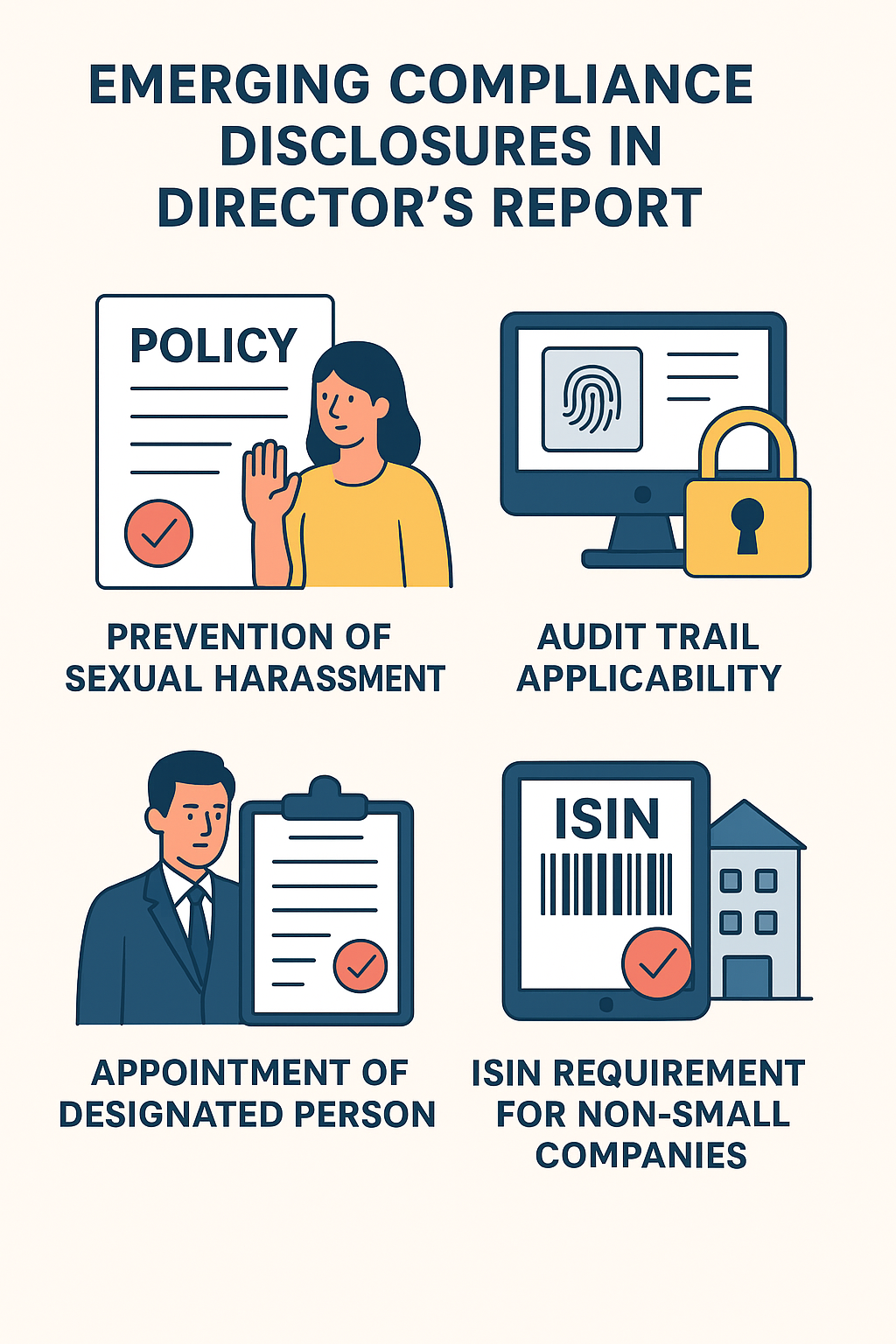View News
Emerging Compliance Disclosures in Director’s Report under the Companies Act, 2013

Emerging Compliance Disclosures in Director’s Report under the Companies Act, 2013
The Director’s Report, mandated under Section 134 of the Companies Act, 2013, is one of the most important statutory documents of a company. Over the years, it has evolved into a comprehensive governance disclosure, incorporating requirements from the Companies Act, SEBI (for listed entities), and allied legislations.
Recent amendments and MCA notifications have significantly broadened the scope of disclosures, particularly in the areas of workplace safety, audit integrity, compliance accountability, and securities tracking. The key areas of focus are discussed below:
1. Prevention of Sexual Harassment (PoSH) Disclosure
Legal Provision:
-
Section 134(3)(q) of the Companies Act, 2013 read with Rule 8(5)(x) of the Companies (Accounts) Rules, 2014) requires the Board’s Report to include a statement regarding the constitution of an Internal Complaints Committee (ICC) under the PoSH Act.
-
The governing statute is the Sexual Harassment of Women at Workplace (Prevention, Prohibition and Redressal) Act, 2013 ("PoSH Act").
Applicability:
-
Mandatory for all companies except One Person Companies (OPCs) and Small Companies (MCA Notification dated 5th June 2015 exempting them under Section 134(3)).
Disclosure Requirement:
-
Confirmation that the company has formulated an Anti-Sexual Harassment Policy.
-
Confirmation that an Internal Complaints Committee (ICC) has been constituted under Section 4 of the PoSH Act.
-
Details of complaints received, disposed of, and pending during the financial year.
Suggested Table Format for Director’s Report:
| Sl. No. | Nature of Complaints | Received | Disposed | Pending |
|---|---|---|---|---|
| 1 | Sexual Harassment | |||
| 2 | Workplace Discrimination | |||
| 3 | Child Labour | |||
| 4 | Forced Labour | |||
| 5 | Wages and Salary | |||
| 6 | Other HR Issues |
Practical Note:
If no complaints are received, the Board should make a negative declaration, e.g., “The Company has not received any complaint on sexual harassment during the financial year under review.”
2. Audit Trail Applicability
Legal Provision:
-
Rule 11(g) of the Companies (Audit and Auditors) Rules, 2014, inserted via MCA Notification G.S.R. 206(E) dated 24th March 2021, mandates that the Board’s Report should confirm the use of accounting software having an audit trail (edit log) feature.
-
Further clarified through MCA Notification dated 1st April 2022 and applicable from 1st April 2023.
Requirements:
-
Companies must use accounting software that:
-
Maintains a record of each and every change made in the books of account.
-
Captures the date, time, and user details for the changes.
-
Preserves the audit trail throughout the financial year without tampering.
-
-
As per MCA’s clarification, preservation of audit trail for record retention purposes is applicable from FY 2023–24 (w.e.f. 1st April 2024).
Disclosure in Board’s Report:
-
Confirmation that the company has used software with audit trail functionality.
-
Statement that the feature operated throughout the year for all relevant transactions.
-
Clarification on applicability of preservation requirements from FY 2023–24 onwards.
3. Appointment of Designated Person for Compliance
Legal Provision:
-
Rule 9 of the Companies (Management and Administration) Rules, 2014, inserted by the Companies (Management and Administration) Amendment Rules, 2023, mandates the appointment of a Designated Person.
Key Requirements:
-
Every company must designate an individual responsible for:
-
Furnishing information to the Registrar or any other authority under the Act.
-
Ensuring compliance with statutory filing obligations.
-
-
The name and designation of such a person must be filed in the Annual Return (MGT-7 / MGT-7A).
Disclosure in Board’s Report:
-
Mention that the Board has appointed a Designated Person in its meeting.
-
Confirmation that the disclosure has been appropriately reported in the Annual Return.
4. ISIN Requirement for Non-Small Companies
Legal Provision:
-
Rule 9B of the Companies (Prospectus and Allotment of Securities) Rules, 2014, inserted via the Companies (Prospectus and Allotment of Securities) Second Amendment Rules, 2023 (Notification dated 27th October 2023).
Applicability:
-
All public companies (except small companies) which issue any securities.
-
The company must obtain an International Securities Identification Number (ISIN) for each type of security issued.
Purpose:
-
To bring transparency and traceability in unlisted public company securities.
-
To align with SEBI’s framework on dematerialisation and investor protection.
Disclosure in Board’s Report:
-
Confirmation that the company has complied with the requirement of obtaining ISIN for its securities.
-
Status of dematerialisation of its securities, if applicable.
Conclusion
The inclusion of disclosures on PoSH compliance, Audit Trail, Designated Person appointment, and ISIN requirement marks a significant shift in the compliance framework under the Companies Act, 2013.
These provisions collectively aim to:
-
Strengthen workplace ethics and employee protection (PoSH).
-
Ensure financial accountability and transparency (Audit Trail).
-
Enhance regulatory compliance responsibility (Designated Person).
-
Promote investor protection and market discipline (ISIN).
Boards of Directors must be cautious in ensuring that their Director’s Report incorporates these disclosures in a precise, statutory-compliant, and transparent manner. Non-compliance may not only attract regulatory penalties but also impair the governance credibility of the company.
"Unlock the Potential of Legal Expertise with LegalMantra.net - Your Trusted Legal Consultancy Partner”
Disclaimer: Every effort has been made to avoid errors or omissions in this material in spite of this, errors may creep in. Any mistake, error or discrepancy noted may be brought to our notice which shall be taken care of in the next edition In no event the author shall be liable for any direct indirect, special or incidental damage resulting from or arising out of or in connection with the use of this information Many sources have been considered including Newspapers, Journals, Bare Acts, Case Materials , Charted Secretary, Research Papers etc

